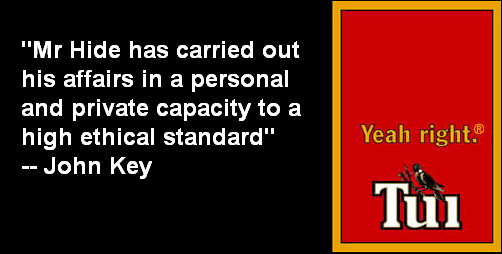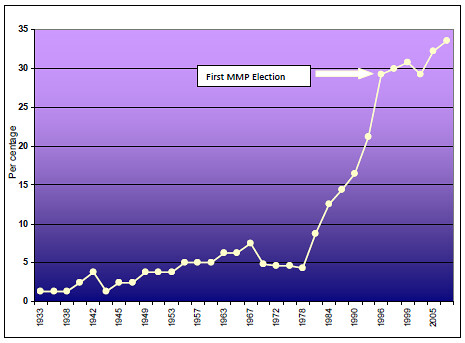Today the Law Commission released its issues paper [PDF] on the Official Information Act. This is the second stage of their review, aimed at getting public feedback on preliminary recommendations. I'll have some more thoughts on particular areas soon, but here's the general overview.
Firstly, the Herald is highlighting the suggestion to scrap the executive veto over release (which is a good idea), but that's burying the lead. The real story from this is that in a paper entitled The Public's Right To Know, the Law Commission is proposing to restrict that right by expanding the withholding provisions applying to "confidential" and "free and frank" advice. These are so vague as to allow Ministers and agencies to drive a cast-iron rhinoceros through, and as a result they are widely abused. Pretty much anything can be hidden this way - and because its secret, we don't know if its dubious or not.
These provisions exist for two reasons. Firstly, to protect the ability of Ministers to receive blunt advice. There's a definite public interest there, in that if an idea is bullshit, public servants need to be able to say so. But I don't see why it requires secrecy. Those public servants are professionals, and are expected to give such advice as part of their jobs. The "free and frank" clause in fact protects Ministers from having the quality of their decision-making scrutinised. And that's not something they deserve protection for. If a Minister was advised that a policy would lead to a disastrous outcome, and they pushed on and did it anyway, that is something we deserve to know. More secrecy in this area is the exact opposite of what we need, and what we have a right to.
The second reason is summed up by the Law Commission as
The ability of the government to govern requires some room for deliberation in private to develop and consider ideas without fear of adverse consequence
Or, to put it another way, apparently government can't operate if us dirty peasants are looking over its shoulder all the time. Which is exactly the sort of monarchical bullshit the OIA was passed to eradicate.
Here's a thought: rather than trying to hide behind secrecy, Ministers could explain their decisions. If they were advised that a particular course of action might lead to a bad outcome, but want to press ahead with it anyway, they could explain why and what precautionary measures they were taking to mitigate that outcome. In short, they could treat us as democratic citizens with an interest in government, rather than as subject peasants who must be kept away from it. But that would require Ministers to stand up and be accountable for their decisions - which is the very last thing they are interested in.
What else? The Law Commission discounts complaints of delays on the basis that
Recent research... indicates that the great majority of requests are responded to well under the statutory maximum of 20 working days.
I can't really fault them on this, as they went with the information they had at the time. But I think that contention is absolutely unsupportable in light of my research on
Ministers, which showed that on average only 70% of requests were processed on time, and that the median time was around 20 working days. While I haven't posted it yet (I'm still waiting on a few), government departments showed a similar picture, with a few honourable exceptions like the Ministry of Justice who took the "as soon as practicable" clause seriously.
The good news is that they are recommending that somebody collect and publish these sorts of performance statistics as part of the ongoing monitoring of the Act. Which means we will be able to use them as an ongoing spur to drive performance. They're also recommending greater guidance by the Ombudsmen and/or SSC to give greater consistency in decision-making, which would be welcome.
Unfortunately, despite the massive advances in information technology (and public expectations of openness), they don't recommend reducing the 20-day limit, as
it would be unrealistic to reduce the maximum timeframe at a time where, for reasons of economic necessity, the public service is required to shoulder its core responsibilities with reduced or no increased resources.
They're absolutely right that this is a question of resources. But we shouldn't allow the government to use the recession as an excuse for secrecy. Freedom of information is like democracy - you pay whatever it takes. A shorter limit would mean a better democracy and a more responsive, accountable government. And that is something we should pay for, recession or no recession.
The review sidesteps the issue of whether Parliament should be covered by the Act on the grounds that that is being considered in a parallel review of the Civil List Act (which seems an odd place to do it). But they do recommend it be extended to cover the Parliamentary Counsel Office, and to operational aspects of the courts. They also recommend consolidating the list of bodies the Act applies to in one place, rather than having them scattered around the schedules to the OIA, Ombudsmen's Act, Crown Entities Act and various other places.
This is an important review, and one we should all speak up on. Submissions are due by December 10.







